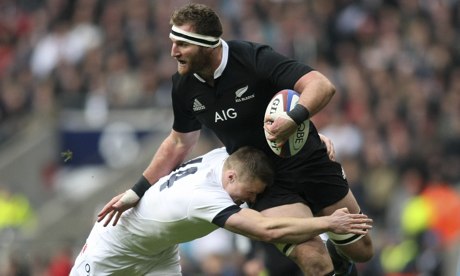
There was a moment in their third game of the autumn series when it seemed that England were about to make what all teams seek in their long-range preparations for a Rugby World Cup: The Breakthrough. The forwards and Twickenham – the two do not always go together – were in full cry and the team in white had just taken the lead against the All Blacks and this was going to be a beacon lit at the place where the tournament will be concluded in two years' time.
It didn't quite happen. The moment when Owen Farrell kicked his fifth penalty and 22-20 went up on the scoreboard was turned in the last quarter to 22-30 and the All Blacks went on their all-conquering way, still rewriting the manual, adding more lines to their chapters on being entirely comfortable – to the point of freely giving the ball away – without possession. New Zealand want nothing on the field other than the sniff of a chance, and in that respect remain a long way ahead of the rest of the rugby world.
It is too late to emulate the All Black way, to discover faith in elastic skills at the most stressed times of a game and be able to score when the traditional statistics are stacked against you. New Zealand remain a team apart.
It may be worth remembering that the World Cup, however, comes with its own peculiar strains, as New Zealand and England found out at the last one. The All Blacks survived their crisis at home, beating France by a point in the final, while England on the other side of the world did not, losing by seven points to those opponents in the quarters, the common factor being the French, whose very own gloriously mutinous Word Cup made the combined woes of the host nation and the irredeemably naughty English look like a model of goody-two-shoe (Welsh) conduct.
But the difference – seriously – between Cory Jane and Israel Dagg falling around the North Shore in Auckland, having taken what Ewen McKenzie might refer to as inappropriate levels of alcohol, and England's goings-on in Queenstown was not that great. And there's no guarantee that the best team – by a mile – at this particular moment will not stumble over the tripwires of the next World Cup, to be played a long way from their home. In the closing quarter of the Twickenham final, it may still be safer to follow the old adage of: "We have the ball; we control the game."
England, if that is to hold true, are in a good place. Questions about the balance of the second-row combination were answered by the locks themselves, Joe Launchbury and Courtney Lawes. They can, after all, play together. You want toughness and elasticity – there they are. Chris Robshaw, who, it appears, is forever to wander this world with 6/7 on the back of his hair shirt, showed that the development of a less percussive style is possible. Off-loads rather than contact – there they were.
Dylan Hartley emerged from November as a hooker reborn. Many would never have recovered from the shame of being sent off for abusing a referee – that temptation so hard to resist, but one that, like inappropriate levels of hooch, surely must be in rugby's slightly scary new puritanism – and losing his place on the Lions tour. Interestingly, Richard Hibbard seized his hooking moment on the tour of Australia and is now pushing on for Wales, extending the boundaries of what is possible from the middle of the northern front row. But Hartley is not far behind. His departure through injury in the New Zealand game may have been all that split the difference between England being dreamily ahead of schedule and the reality of knowing there is a way to go yet.
The way to go concerns the three‑quarters. Billy Twelvetrees, like Hartley, cast aside disappointment – in the centre's case his missed tackle on Matt Toomua – and played strongly. But strength – or its lack – is not the problem. England still failed to create much and Chris Ashton remains a fraction of an inch – the distance by which he managed to dab the ball down in time against Argentina – from meltdown. If he tried a flying dive right now, that ancient celebration of life when the wing could do no wrong, you suspect the emergency services would have to attend his landing.
Contrastingly, the trouble with being Mike Brown is that his form is so remarkable and consistent that he serves only to expose the lack of elusiveness – collective and individual – in front of him. It would be a departure from standard practice for the England coach, Stuart Lancaster, to whisper to his full-back to tone it down a bit. You know, so as not to show up the others …
It's possibly more likely he'll say that November provided excellence at 1, 2, 3, 4, 5, 6, 6 and a bit, 8 and 15, and that if the others can play like them, England can go all the way. That means it was a pretty good month's work.

